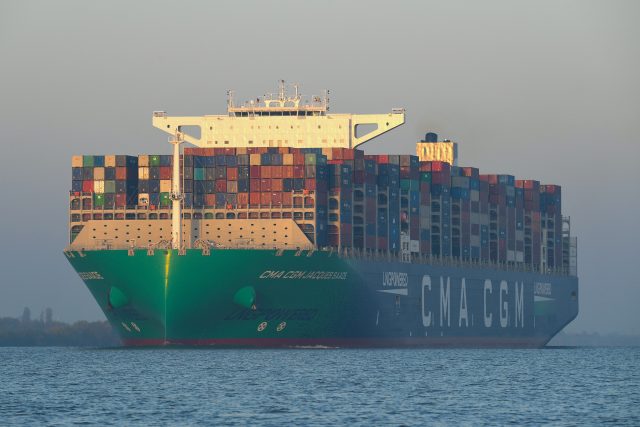This website uses cookies so that we can provide you with the best user experience possible. Cookie information is stored in your browser and performs functions such as recognising you when you return to our website and helping our team to understand which sections of the website you find most interesting and useful.
Act now on your logistics footprint
There’s no escaping the fact that logistics makes a significant contribution to the global drinks trade’s carbon footprint. Producers keen to minimise their environmental impact can therefore achieve dramatic progress by choosing the right logistics partner. Enter the new ACT with CMA CGM+ service, launched late last year by French shipping group CMA CGM.

At the heart of ACT is a fleet of containerships powered by a combination of liquefied natural gas (LNG) alongside biomethane, synthetic methane and e-methane. With 20 vessels already in service, the company aims to offer a 44-strong “e-methane ready” fleet by 2024.
A CMA CGM spokesperson hailed LNG as “currently the best and most readily available solution for reducing shipping’s environmental footprint and preserving air quality, which is a major public health concern.”
Setting out the benefits of LNG, he claimed: “It reduces sulphur oxide emissions by 99%, particulate matter emissions by 91%, and nitrogen oxide emissions by 92%, far exceeding current local and international regulations. LNG also represents a first step in the reduction of greenhouse gas emissions.”
By signing up to ACT, companies can also choose to offset any remaining environmental footprint. Whatever the combination of reduction or offsetting,the ACT service has been developed with an acute awareness that both clients and, increasingly, the end consumer require measurable, certified proof of any green scheme. As a result, confirmed the CMA CGM spokesperson, “All our calculations and declarations that we provide are verified regularly by a third party and compliant with all applicable ISO norms for environmental declarations.”
Depending on the nature of the product being transported and distance involved, the ACT service promises to reduce greenhouse gas emissions by anywhere between 25% and 85%. The greatest savings come when cleaner energy biofuel is used, with the added bonus that clients can assure their end consumer that the drink in their hand was shipped without using fossil fuel.
The strong environmental credentials of biofuel have made it central to the future evolution of CMA CGM’s services and accordingly a major focus of the company’s current research and development effort. From reducing costs to finding new sources and expanding production of existing ones, success in this area is key to bringing even more customers on board.
The CMA CGM spokesperson highlighted biomethane as a particularly important part of the green fuel equation, confirming: “We have made significant investment to ensure our capacity to scale up its use in the coming few years.”
In addition to helping clients meet their own sustainability targets, these advances help CMA CGM to meet significant ambitions of its own. The group aims to be carbon neutral by 2050 and since 2008 has already reduced its CO2emissions by 49% based on TEU-km (the movement of one twenty-foot equivalent unit of capacity in a container ship over one kilometre).
This may represent the progress by a single company but it’s clear that both ambition and achievement rely on a far bigger chain. From consumers to producers, demand for lower carbon emissions is becoming ever stronger. That in turn fuels the investment and research required to achieve these targets. ACT is the result of just such momentum and, based on the initially positive customer response, it’s an initiative set to go full steam ahead.

